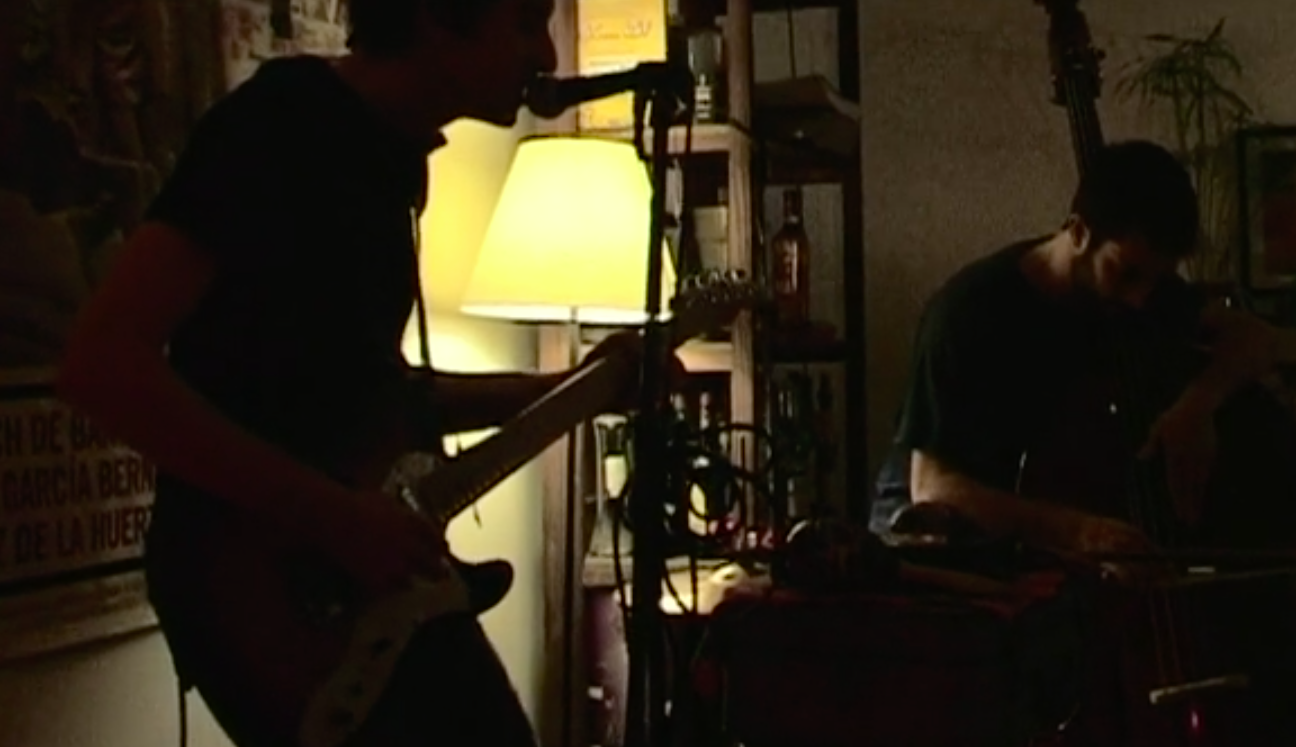Michael S. Judge
People are the first indication that you’ve moved from Djuna’s city to Tom’s. People: better to call them figures. They behave in only one way, not the same way but one way each. They’re doing what they do whenever you look. Unobserved they likely hide, lay folded or at length in canisters under the street like tanks of obsolete poison.
The ones wrapped in on themselves may burst with new selenotropic buds that spring up where brows rub wrists. Dirt-caked blooms with stiff seaweed fans, picked by other flowers and other fish into a comb of rigid tendrils. Fed by cool milks of the moon. Fed on white drink with ribbons curling through it, blue and moonflecked like Pierrot’s face.
The ones laid out full-length must grow by diminution, like corpses getting bigger. Their chests will rise to lower points and filter out less yeast; their eyes will sink nearer to the tank’s tarnished surface and take root in metal clefts. With their other flesh laid aside, stretched full elsewhere and eyeless, such eyes would stand like glistened marshland plants. An eye unglassed, unglazed, still shocked by sight, atop a stalk of greasy nerves. And every slump toward the floor makes these bodies longer. When they die, we think, they die as man-shaped patches of damp. Not a fingernail thick, but thirty feet between their toes and the eyes that stand still upright.
Cave paintings made with human soap.
Read MoreWe believe that your home should make you happy.
We believe that when it comes to decorating, the wife is always right. Unless the husband is gay.
We believe in carbohydrates and to hell with the puffy consequences.
We believe minimalism is a bummer.
We believe handcrafted tchotchkes are life-enhancing.
Read MoreI wanted to know what’s the deal with BJ Thug Life, and so recently I went to a metal show in Beijing with thirty-thousand Chinese stuffed down my pants. By which I mean the currency, not the people. Why I was carrying this brick of cash next to my penis is my own business, but what happened that night is everyone’s business.
Now, I want to be clear about something right from the start. I know nothing about metal. Everything I know about metal, I learned from Wikipedia or overheard in the bars of Oregon. And really, the only reason why I was there that night is because my brother wanted to see some metal, and BJ Thug Life is all I could find.
We were at Yugong Yishan. One of those really swanky really dingy joints, housed inside one of Beijing’s many historic walls. With the classic Chinese lion statue by the door and just a few feet from the gate of the mammoth and presumably ancient estate housed behind that wall. And the room was full of what appeared to be the Chinese version of nerdy seriously overweight ipad-obsessed auteurs, scrawny undergrads, and beefy jocks. (I did catch sight of one or two other actual honest-to-god foreigners. The one near us seemed to be genuinely-ironically getting down with the locals over some serious shredding in downtown Beijing, and the other one I only caught sight of for a moment in a long line of banging heads. He looked malnourished and prone to violence, a scrawny good old boy getting his kicks the only way he knows how, but I’m sure he was a very nice man.) And that sock full of cash was weighing down my crotch. And neither of us had any idea what BJ Thug Life really was or where this brotherhood of hoodlums could be found.
Read MoreThe United States Civil Disturbance Plan 55-2
The following information was obtained under the Freedom of Information Act. The original printing was of June 1, 1984. The information herein is UNCLASSIFIED and does not come within the scope of directions governing the protection of information affecting the national security.
In this document signed by the Secretary of the Army, is hereby assigned as DOD Executive Agent for civil disturbance control operations. Under Plan 55-2 he is to use airlift and logistical support, in assisting appropriate military commanders in the 50 states, District of Columbia, and the Commonwealth of Puerto Rico and US possessions and territories, or any political subdivision thereof.
The official name of this project is called “Operation Garden Plot.”
Read MoreJanuary 25, 2012 2:00pm
Dear Wes Anderson, I heard you took the train from Chicago to southern California. I thought it was kind of cute to hear you don’t like airplanes. They scare me too, somewhat, but not enough so that I can’t ride them. The other night, Brett told us the story. He’d been gone for Christmas to Columbus, Ohio. He didn’t mention the train story until after a couple beers at the kitchen table. I showed him I Love Dick by Chris Kraus—a series of billet-doux glitter bombs from a married couple to a man named Dick.
Read MoreAs I’m going through this awful break-up, I feel that the animals should only be in the zoos so to watch the humans. My crying, in public—as the pain invades the numb shock—is present only in short, cacophonous bursts; my decades of socialization have cause it to cut off before it becomes the blubbery mess it could be, in front of Chicago. The sensation is entirely involuntary. And it’s wordless like the break-up conversation might as well have been; words are said, plenty of them, but they’re ultimately just the texture of mine and her’s confused, angsty horse-wails.
Read MoreThis book is about alien sex.
Not imperialist, colonial sex, with human male astronauts dominating winsome green-skinned babes à la Captain Kirk. Nor is it bestial. This is real mutual discovery and understanding between sentient beings. It’s not something you see much in science fiction — in Tiptree’s short stories, admittedly, and to a lesser extent with Heinlein and Delany, although that’s mostly human-on-human stuff. Not that I’m a connoisseur.
Read MoreRock Albany laughed. He stood naked at the edge of a cliff. His windswept hair was neither blond nor red, but black, as black as a melon. His face was like a law of nature, like the call of the herd. He had the mouth of an executed saint.
Rock laughed and shook his head, then dove into the lake far below. He swam easily to the far shore, where he dressed, then strolled down a path. He walked swiftly, with a loose, lazy expertness of motion. He walked down the long road on the sun, the sun’s only road. The sun was his home. He had lived there for seventeen years. Most men would die if they tried to live on the sun. They would burn up at once. Rock laughed at this thought. He found the sun charming. The sun, he thought, has been waiting here just for me. Waiting to be ripped apart by my dynamite and drill. Waiting for the new shape my hands will give it. He would paint it pigeon blue. He would install a Pekinese buttress. He would hand-raise pudgy canaries. Rock liked canaries. Their eyes never missed a thing. They made a man feel as though he did not exist. They stared with a sudden resentment. They knew that they were naked in their cage. They suffered in this world. Rock knew that the canaries would suffer to live inside cages on the sun. He didn’t know how long they would hold out, staring at him with their damned eyes, before they burned up. He would go through a lot of canaries. He’d have to skimp and slave to afford so many. He would need them at once. He resolved to call his best friend and supplier, the Duke. But then he forgot. He didn’t give a damn.
Read Moreherocious
Originally published in The Open End
For some reason three is a good number. There’s a balance to three, a symmetry that seems to establish an axis. Three is triptych, three is trinity. With a title like REVELATION I feel like trinity is the more applicable to Colin Winnette’s first novel.
It’s a good book. There’s a weight to it that sits heavy and savory, like the first book you ever read.
Read More1. Art manifestos, despite the good intentions of the writer should always “be taken with a grain of salt” as the cliché goes, because they are subject to the ego, pretensions, and plain old ignorance and stupidity of their authors. This goes all the way back to the Die Brücke manifesto of 1906, and continues through time to this one that you’re reading now. A healthy wariness of manifestos is understood and encouraged. However, the ideas put forth here are meant sincerely and with the hope of bringing inspiration and change to others, as well as to myself.
2. Remodernism seeks a new spirituality in art. Therefore, remodernist film seeks a new spirituality in cinema. Spiritual film does not mean films about Jesus or the Buddha. Spiritual film is not about religion. It is cinema concerned with humanity and an understanding of the simple truths and moments of humanity. Spiritual film is really ALL about these moments.
Read MorePaul Kincaid
Originally published on The SF Site
To begin with, these short fictions are funny.
They are also experimental, wayward and surreal, any of which might make them seem far more serious and “worthy” than they actually are.
They are not stories in the conventional sense. Some of them may offer a narrative, but if you try to follow them too closely you will find characters change, chronologies wander all over the place, and an obsessive interest in something mundane and irrelevant will suddenly intrude into the text. They take risks with what we expect of our fiction, which is a good thing, but not all the risks pay off, of course. This means it is all too easy to linger over phrase-making or ponder construction, or otherwise consider the success or failure of the individual pieces in some drily academic way. But that would be to miss the simple joie de vivre, the devil-may-care insouciance of the pieces.
Read MoreNoctuary (i)
The brass locket, which contained only an empty frame, was the first in a series of ominous love tokens that appeared beneath her window.
*
When he fastened the clasp on her necklace, every nightingale seemed to sing. Their swollen throats and colorless eyes.
*
He reminded her of Petrarch, driven by the necessity of pursuit. The beloved as interchangeable, a vessel. A bird heaving under the weight of an otherworldly song.
Read MoreMy friend Bradshaw’s been out of a home for some weeks now. A year or so ago, the owner of the building Bradshaw rented in, in Chicago, was foreclosed upon—and not just in Bradshaw’s building. The owner was held up to a debt in the range of thirty million dollars, spread across many foreclosed-upon properties, and he thus fled to his native Ukraine.
Read More





















